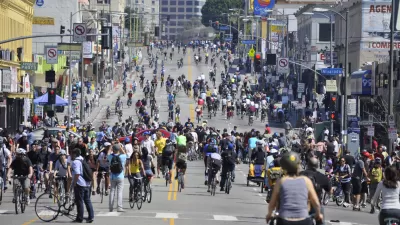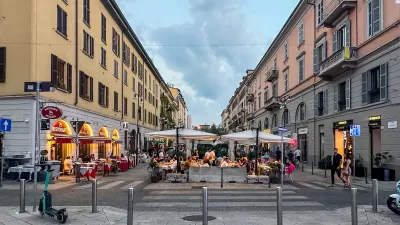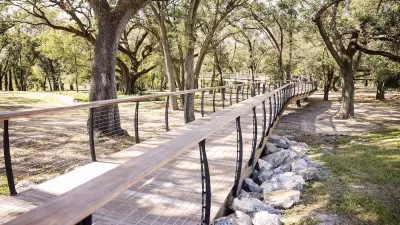An interdisciplinary team of urban designers, architects, and analysts have proposed a neo-retro-futurist scenario for making downtown Portland nearly car-free by 2050.
Portland may be taking a nod from Los Angeles' 70's-era planning history to make future development in their downtown area car-free, or almost car-free by 2050. Yesterday, the urban planning and policy blog Hugeasscity reported on a GGLO proposal to repurpose the city's historic Memorial Coliseum building, located at the perimeter of the downtown core, into a colossal automated park and ride.
In typical Portland fashion, however, there is a Green-ish twist. Instead of cementing a future of auto-dominated travel, the building will become the opening salvo in the car's ultimate retreat from the City. At first, the park and ride (called a "mobility hub") will serve as a redevelopment catalyst – freeing most new construction in the downtown core from the financial and spatial burden of providing parking, thereby enabling increased overall density and affordability. Very much like a giganto-scaled version the "Park Once" garages that supported the recent revitalization of the 3rd Street area in Santa Monica and East Colorado Boulevard in Pasadena, or a modern reinterpretation of LA City's 1970 plan that located massive parking structures on the 101, 110, 5, 10 loop around downtown. The big difference here is threefold: Portland's garage will be 500 feet from high-quality regional rapid rail and bus transit, it's 5200-car capacity would be a civic spectacle in and of itself, and it's use as a garage that facilitates auto travel would sunset. After 40 years, when urban density and vibrancy have increased to the point that cars as we know them are obsolete, the building will become a car memorial museum. With the push of a button, visitors could "order up" any one of the 5200 cars stored in the collection, and it would be delivered to their feet for viewing.
The Coliseum "mobility hub" would be one of a series, whose modular automated parking units could be disassembled or repurposed when density near the core increases, and reassembled farther out to catalyze compact development elsewhere.
The proposal is an audacious response to the 2010 Rose Quarter "Call for Concepts" and to Portland's bold 2009 Climate Action Plan, which requires an 80% reduction of GHG emissions by 2050, when population is forecast to have grown by 90%.
FULL STORY: Coolest Park and Ride Ever

Alabama: Trump Terminates Settlements for Black Communities Harmed By Raw Sewage
Trump deemed the landmark civil rights agreement “illegal DEI and environmental justice policy.”

Planetizen Federal Action Tracker
A weekly monitor of how Trump’s orders and actions are impacting planners and planning in America.

The 120 Year Old Tiny Home Villages That Sheltered San Francisco’s Earthquake Refugees
More than a century ago, San Francisco mobilized to house thousands of residents displaced by the 1906 earthquake. Could their strategy offer a model for the present?

Opinion: California’s SB 79 Would Improve Housing Affordability and Transit Access
A proposed bill would legalize transit-oriented development statewide.

Record Temperatures Prompt Push for Environmental Justice Bills
Nevada legislators are proposing laws that would mandate heat mitigation measures to protect residents from the impacts of extreme heat.

Downtown Pittsburgh Set to Gain 1,300 New Housing Units
Pittsburgh’s office buildings, many of which date back to the early 20th century, are prime candidates for conversion to housing.
Urban Design for Planners 1: Software Tools
This six-course series explores essential urban design concepts using open source software and equips planners with the tools they need to participate fully in the urban design process.
Planning for Universal Design
Learn the tools for implementing Universal Design in planning regulations.
Clanton & Associates, Inc.
Jessamine County Fiscal Court
Institute for Housing and Urban Development Studies (IHS)
City of Grandview
Harvard GSD Executive Education
Toledo-Lucas County Plan Commissions
Salt Lake City
NYU Wagner Graduate School of Public Service





























